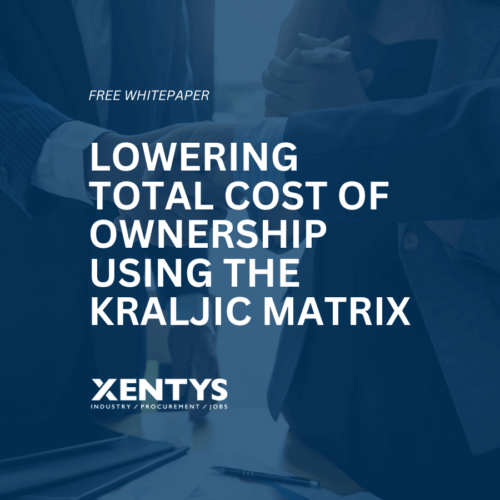Table of contents
Supply Chain Management (SCM) is essential for companies looking to gain a competitive advantage and become more efficient. It includes the entire process of managing goods and services, from the purchase of raw materials to the external supply of the final product. By optimizing integrated supply chain management, companies can save time, money and resources. At the same time, the quality of products can be improved. Effective management of the entire supply can also reduce expenses, balance inventory and improve customer service. Therefore, it is important for companies to optimize their supply chain to stay ahead of competitors within today’s market.

FREE WHITE PAPER
Reduce Total Cost of Ownership (TCO) with the Kraljic Matrix
Why apply supply chain management?
Implementing effective management can significantly benefit organizations and help them achieve business goals. Read on below as to why you should adopt Supply Chain Management.
The Purpose of Supply Chain Management
SCM strives for an efficient workflow from source to customer. By implementing it, companies can reduce costs, improve quality, improve delivery times and minimize risk. In addition, better relationships with suppliers and partners can be built. This can lead to advantageous purchase prices and increased profitability. SCM also supports customer needs, improving customer satisfaction and loyalty. All in all, SCM is essential for any business that values efficiency, profitability and customer satisfaction.
Examples of Supply Chain Management in Practice.
Supply Chain Management is ultimately used by companies to provide products or services. Industries ranging from retail and manufacturing to food and healthcare use SCM. Some examples include JIT inventory management, using technology such as RFID tags and implementing sustainable processes. This could include reducing waste or partnering with a sustainable logistics provider to reduce costs and increase transparency. Applying SCM in practice can bring numerous benefits to companies.

Logistics vs supply chain management
SCM is often confused with logistics. While both terms are related, they really have different meanings.
The difference between logistics and supply chain management
Logistics focuses on the physical aspects of the supply chain, such as transportation, warehousing and distribution. Supply Chain Management includes logistics as well as other key elements. Consider purchasing, production and customer service. So it is a significant difference. SCM is a more comprehensive approach that optimizes and integrates various processes. This ranges from the production of raw materials to the end user. So while logistics is essential to an optimal supply chain, SCM takes into account the entire supply chain ecosystem and supplier collaboration within it.

FREE WHITE PAPER
Reduce Total Cost of Ownership (TCO) with the Kraljic Matrix
How are these two parts related?
Although supply chain management and logistics are separate, they are closely related. Logistics is a physical process of transportation and storage of goods, while Supply Chain Management includes the entire flow of goods, services and related information from procurement to distribution. Optimizing logistics processes by reducing lead times, inventory management and transportation costs is at the heart of effective SCM. The application of advanced technologies such as the Internet of Things, automated storage systems and predictive analytics can help further optimize logistics processes and provide real-time visibility of the potential supply chain. So it is clear that Supply Chain Management and logistics are closely linked and are an essential part of skillfully managing the flow of goods and services.
Key challenges in supply chain management
Supply Chain Management presents companies with several challenges, including market uncertainty, risk management, changes in customer expectations and the need for greater transparency. Addressing these issues will require optimal cooperation among supply chain partners. Sustainability is also essential today when it comes to successful supply chain management. All this requires a complete approach from supplier to manufacturer that takes into account collaboration, innovation and sustainability.
The benefits of deploying supply chain management
First and foremost, supply chain management can help companies stay competitive. An efficient supply chain can reduce costs, increase productivity and improve customer satisfaction. Better coordinating and organizing production and delivery can reduce lead time and supply levels. Moreover, risks such as discontinued operations or distribution can be minimized through appropriate supply chain management. All this leads to greater customer satisfaction and better relationships with suppliers and other stakeholders. In short, proper management of operational processes helps a company succeed in today’s times while meeting customer needs.
The impact of Supply Chain Management on business operations.
Supply Chain Management can improve an organization’s operations by managing supply chain logistics. This can provide benefits such as faster delivery times, lower transportation costs, better inventory management and greater customer satisfaction. All of this leads to increased sales, competitiveness and profitability. But companies will also be aware that reverse inefficient supply chain management can lead to higher costs, late delivery of products and services and dissatisfied customers. This can damage the company’s reputation and lose market share. A properly trained logistics employee can contribute greatly to operational planning. In short, effective supply chain management is essential to a company’s success.
Find a buyer through xentys
At xentys, your experienced procurement recruitment agency, we are happy to help you find the right professional for your procurement team. Send a message today and strengthen your purchasing department.
Sustainability and supply chain management
Supply Chain Management is receiving increasing attention to sustainability. Companies are under pressure to reduce emissions and optimize processes for social and environmental sustainability. Sustainability relates to material use, minimizing waste and promoting ethnicity. Companies can work with supply chain partners to use sustainable methods and materials. This allows organizations to minimize the impact of transportation and distribution. Implementing sustainable practices can lead to a better reputation and attract new customers. Integrating sustainability into supply chain management meets societal, legal requirements and contributes to a better future for people and the environment.
Integrating Sustainability into Supply Chain Management
Companies can integrate sustainability into their supply chain management in several ways. As a company, you can partner with parties that use sustainable practices and resources. A company can also make sustainable adjustments for production methods and obtain sustainability certifications such as FSC or MSC. Furthermore, companies can use advanced technologies to improve the transparency and traceability of the entire process and verify the origin of materials. For an organization, this not only temporarily conforms to cultural and official regulations, but also helps build an environmentally friendly future. The whole thing is guaranteed to benefit reputation and provide long-term cost savings.
News

What is the meaning of SKU?
A SKU, or Stock Keeping Unit, is a unique code used to identify a specific product that is in stock. This alphanumeric code is indispensable for inventory management and logistics operations, as it allows products to be tracked and managed. SKUs can contain information about a product’s features, such as

What is meant by the 80 20 rule?
The 80/20 rule, also known as the Pareto principle, is an economic rule that states that 80% of all results come from 20% of all efforts. This rule was first introduced by Italian economist Vilfredo Pareto, who discovered that 80% of the land in Italy was owned by only 20%

What does 3PL & 4 PL mean?
The terms 3PL (Third-Party Logistics) and 4PL (Fourth-Party Logistics) play an important role in supply chain management today. But what exactly do those terms mean? 3PL refers to a logistics service provider that outsources specific logistics functions, such as transportation, warehousing and distribution, to an external party. These service providers

What is a freight forwarder?
A freight forwarder, also known as a forwarding agent, is an essential link in the logistics chain. This party organizes and coordinates the transportation of goods from one location to another. In this context, the necessary means of transportation, such as trucks, ships or aircraft, must be arranged and the

